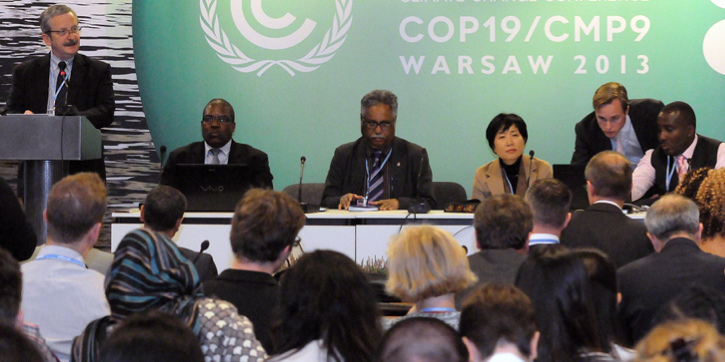The Global Environment Facility (GEF) organized a side event during the Warsaw Climate Change Conference on National Adaptation Plans (NAPs), challenges and opportunities for climate-resilient development.
 20 November 2013: The Global Environment Facility (GEF) organized a side event during the Warsaw Climate Change Conference on National Adaptation Plans (NAPs), challenges and opportunities for climate-resilient development.
20 November 2013: The Global Environment Facility (GEF) organized a side event during the Warsaw Climate Change Conference on National Adaptation Plans (NAPs), challenges and opportunities for climate-resilient development.
Moderated by William Ehlers, GEF, the event highlighted NAP focal areas, approaches to climate change, and national-level examples. Christoph Feldkoetter, Deutsche Gesellschaft für Internationale Zusammenarbeit (GIZ), highlighted active engagement with other NAP providers. Noting vulnerabilities to the increasing intensity and frequency of natural disasters, Ainun Nishat, Vice Chancellor, BRAC University, Bangladesh, highlighted the threat of displacement and out-migration, emphasizing that adaptation has to be on the ground level.
Naoko Ishii, GEF CEO and Chairperson, stated that the GEF is at the front of efforts to help developing countries cope with climate change, noting the need to enhance policy and planning at all decision-making levels.
Aloysius Kamperewera, Ministry of Environment and Climate Change Management, Malawi, noted the need for a comprehensive approach to climate change, with attention to mitigation, adaptation and enabling factors.
Rawleston Moore, the GEF Secretariat, emphasized the need for country-driven and coordinated NAPs, highlighting the NAP Global Support Programme (NAP-GSP) which includes: a focus on targeted technical assistance; South-South and North-South cooperation; use of best science and expertise; and inter-country cooperation and exchange.
Pointing to NAP work supported by EU member states, Feldkoetter identified four steps for initial guideline set-up: laying groundwork and addressing gaps; identifying preparatory elements; crafting implementation strategies; and undertaking measurement, reporting and verification (MRV).
Mohammed Zmerli, Ministry of Environment, Tunisia, described the NAP process in Tunisia, identifying the need for a sectoral adaptation approach, an ecosystem approach, and an integrated approach including early warning systems and a national climate change strategy.
The ensuing discussion addressed: gender mainstreaming in NAPs; the relationship to Nationally Appropriate Mitigation Actions (NAMAs); the role of the private sector and non-governmental organizations (NGOs); support for NAPs in non-least developed countries (non-LCDs); and the role of water as a decentralized sector and possible engagement with NAPs. [IISD RS ENBOTS coverage][IISD RS video coverage]